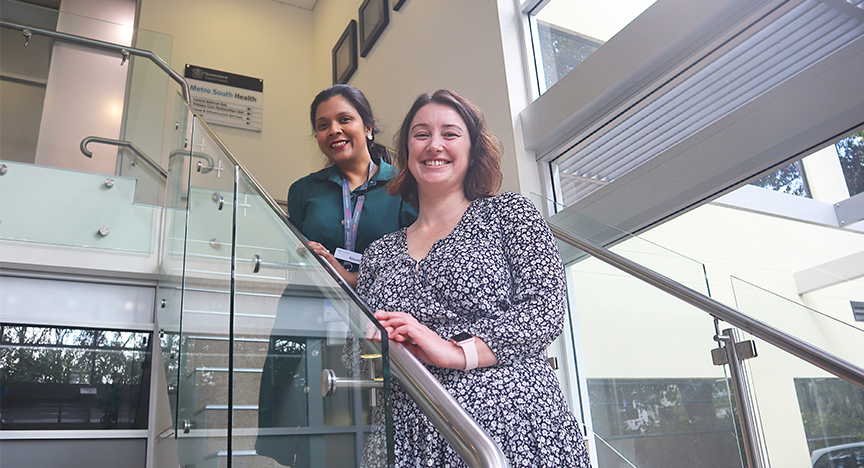
Navigating the healthcare system can be a daunting challenge, especially when facing complex medical journeys or the loss of a loved one. For Nicola and Nawmi, their roles as clinical Principal and Senior Consumer Liaison Advisors within Metro South Health revolve around addressing these complexities with empathy and a focus on clarity.
Nicola and Nawmi (Physiotherapist and Occupational Therapist, respectively) bring their clinical expertise to their current roles, where they handle some of the most intricate complaints within the Metro South healthcare system. You might hear from them directly as they work closely alongside the Executive, Consumer Liaison Officers, and staff at Metro South Health’s facilities.
"Our day-to-day involves listening to patients and families, helping them understand what has happened during their healthcare journey, and being open to genuinely learning how we might do things differently in future," explains Nicola.
"Often, it’s when something serious has occurred, such as the death or harm of a patient, or when their health care involves piecing together a journey across multiple facilities or health services."
The duo’s work is more than just resolving complaints. It’s about translating complex medical terminology and procedures into language that patients and families can understand, while also identifying areas where the healthcare system can improve.
"Healthcare is inherently complex, even for those of us working in it, understanding how all the pieces fit together can be challenging. Our role is to not only explain this to patients and families but also to learn from each case and make systemic improvements. It’s about looking after what is entrusted to us – their health, " said Nawmi.
Nawmi recalls one such case involving a family who had lost a loved one.
“It was quite a complex complaint… There were nine or ten areas across three different hospitals involved.” She explained how they worked with the family to address their concerns, eventually reaching a resolution that left the family feeling heard and supported.
For Nicola, she had a similar powerful reminder of the importance of clear communication and restoring trust.
“A gentleman’s wife passed away from cancer suddenly, during the pandemic. He was left with so many questions about her care and a sense of being profoundly let down when it counted the most,” she said.
Instead of just providing written responses, Nicola and the team met with the family to walk them through their concerns in person.
“At the start of the meeting, the family wanted access to their loved one’s records because they wanted to verify for themselves what had occurred. At the end of the meeting, they showed us a photo of their loved one, and when I offered to assist in the process of obtaining her records, they no longer felt it was needed as we had answered their questions and worries,’” said Nicola.
“It was gratifying to know that we had been able to restore their trust and help them process such a difficult part of their life.”
Both Nawmi and Nicola are strong advocates for health literacy, believing that clear communication can alleviate much of the uncertainty and fear patients experience. They promote the "teach-back" method, which encourages healthcare professionals to ask patients to explain in their own words what they understand about their condition or treatment.
"It’s about meeting people where they’re at," Nicola explains.
"Start simple and build up. Health literacy is fluid, and the more we ensure patients understand, the more secure they feel."
Their work also extends to improving how Metro South Health collects and responds to feedback. The ‘Have Your Say’ initiative allows patients to submit complaints or compliments through various mediums, including written, audio, and video formats, ensuring accessibility for all. The feedback is then used to inform continuous improvements across the health service.
For Nicola and Nawmi, their roles are not just about resolving conflicts—they're about ensuring that every patient’s voice is heard, every concern is addressed with compassion, and every opportunity for learning is taken to make healthcare better for everyone.
"Never underestimate the power of a kind gesture. It’s not always grand gestures. It’s the small acts of compassion that often have a big impact on how patients feel in our care," said Nicola.
Their message for this Health Literacy Month is clear: making information accessible is the key to a true partnership. And in their world, clear communication goes hand in hand with care. Let’s communicate better, together.